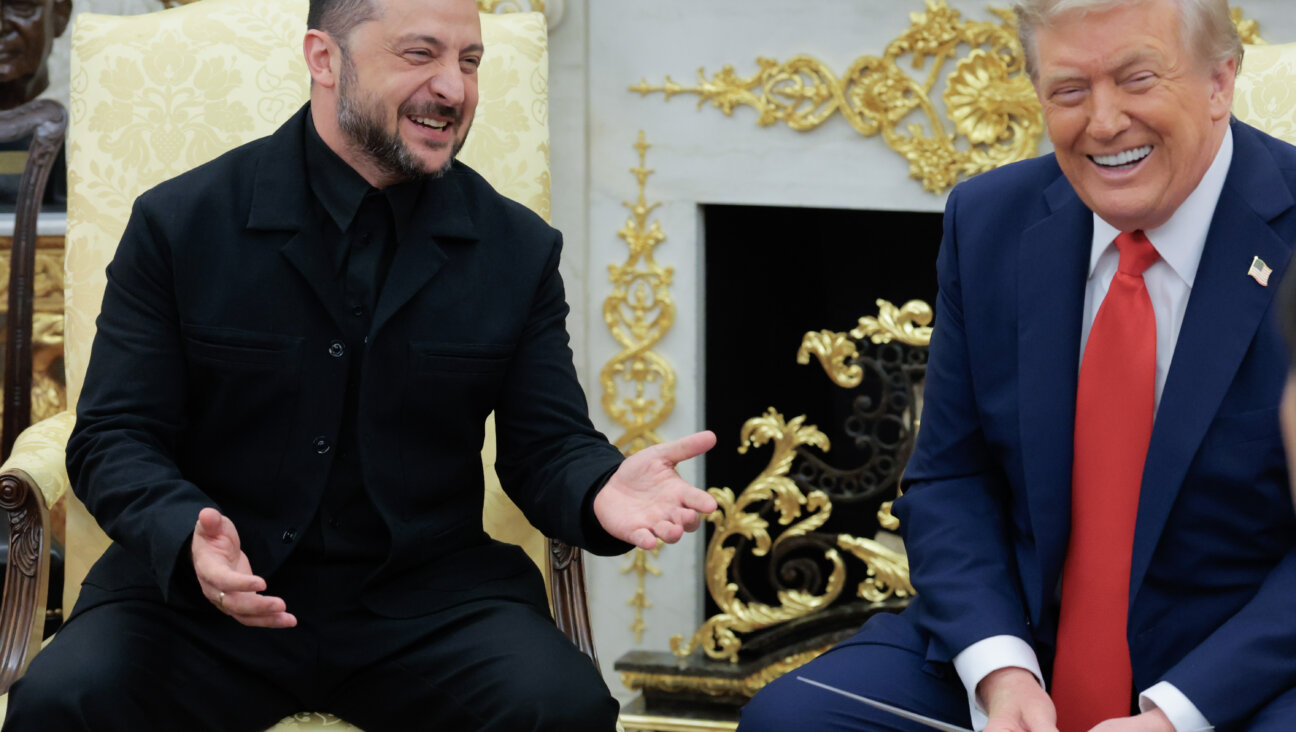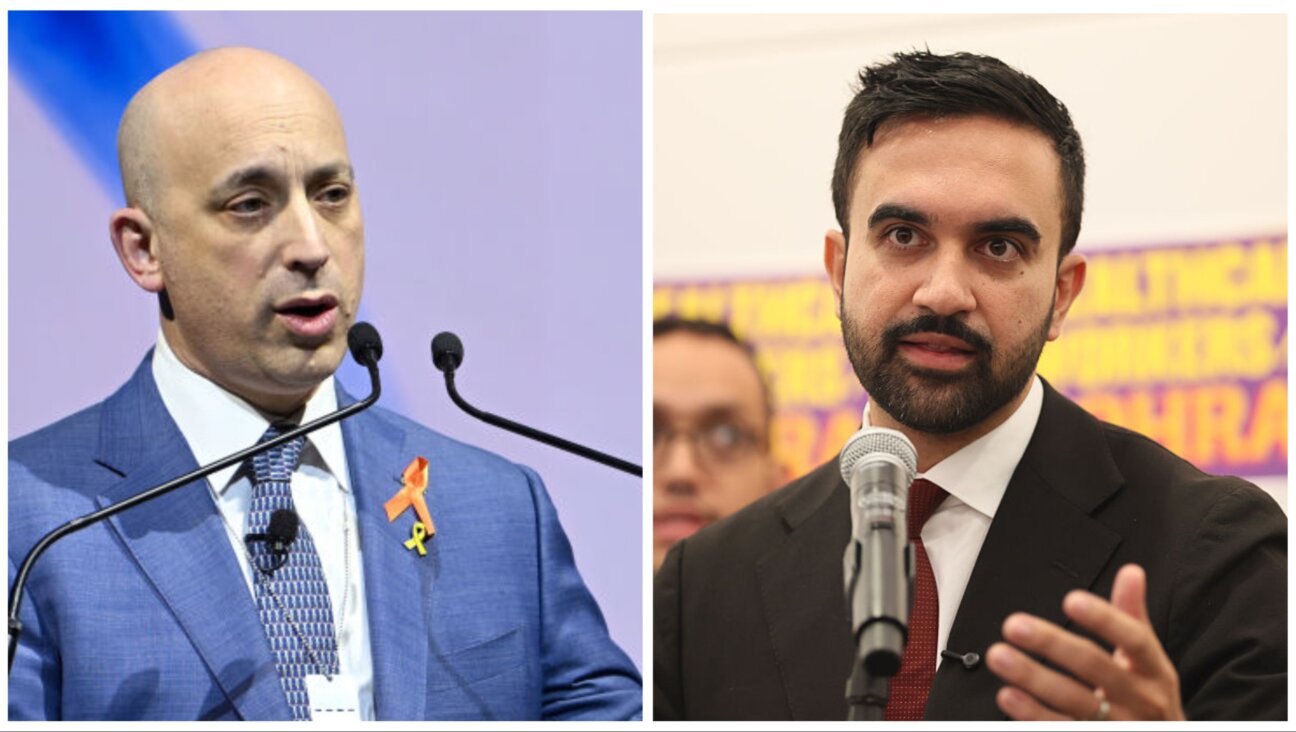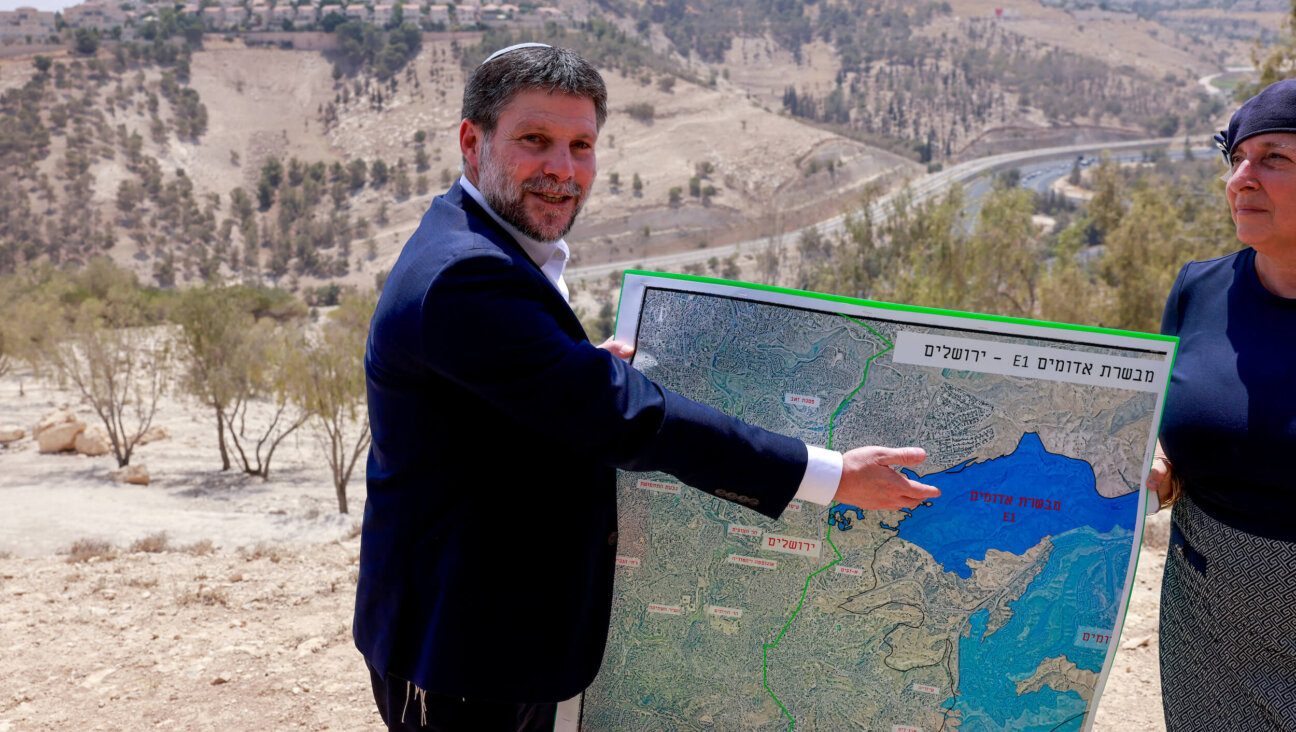One Tenacious Family, Two Inspiring Rabbis

Rabbi Balinsky, Maharat Balinsky Friedman and her son Ezra. Image by Courtesy Maharat Balinsky Friedman.
Cooking for Shabbat dinner, Michael and his daughter Ruth sound like any other father and daughter fortunate enough to spend time in the kitchen together.
The conversation was punctuated with the gentle clinking of pots and pans, and Ruth’s occasional kind reminders not to let the salmon burn. But their casual and frank demeanor masks the impressive legacy that fills the room.
Rabbi Michael Balinsky and his daughter Maharat Ruth Balinsky Friedman have both been named Most Inspiring Rabbis by the Forward — and are the only parent and child to be so honored.
They are each impressive Jewish leaders in their own right. Rabbi Balinsky served as Hillel director at Northwestern for 20 years, growing the program from one that met in a small house detached from the campus into a shining example of sustainable Jewish community. Maharat Balinsky Friedman, a member of the three woman strong inaugural class of the groundbreaking program at Yeshivat Maharat, was the first Maharat — a Hebrew acronym denoting a female leader of Jewish law, spirituality, and Torah — hired by an Orthodox congregation in the United States.
Though it may sound enigmatic to some, Rabbi Balinsky is a prolific Orthodox rabbi who has never worked in an Orthodox setting professionally. He is finishing his 8th year on the Chicago Board of Rabbis and is known for his skill in navigating between pluralistic and multifaith settings — something he sees as rare in the Orthodox community today. He understands the denominational and halachic issues that “create really series distinctions between Orthodoxy and other denominations,” but adds that “no matter what their denomination, rabbis love to get together to study Torah. The more rabbis can study communally together, the better it is.”
Rabbi Balinsky was all of 25 when he became the associate Hillel director at the University of Michigan, where he served for 2 and a half years. When he took the job of Hillel director at Northwestern in 1981, where he ended up staying for two decades, he commuted between the two states every weekend for two months.
Rabbi Balinsky met Maharat Balinsky Friedman’s mother at Northwestern, where she was a graduate student in French literature. They married in June of 1983, and in 1985, Ruth was born. They later had a second daughter, Miriam.
From the beginning, Rabbi Balinsky felt right at home in Evanston. “I love the campus, I love the atmosphere,” he said. In fact, he still davens at the Orthodox minyan on campus.

Rabbi Balinsky and grandson Ezra. Image by Courtesy Maharat Balinsky Friedman.
Rabbi Adam J. Rosenbaum, a student at Northwestern from 1994-1998 who is now the rabbi of Synagogue Emanu-El in Charleston, South Carolina, says that Rabbi Balinsky was instrumental in his decision to become a rabbi himself. “I thought to myself — here is somebody that I respect a great deal, and if I’m going to have the opportunity to be in this kind of a role, that’s where I want to be.”
Because she grew up on a college campus, Maharat Balinsky Friedman was exposed to various interpretations of Judaism from an early age. Shabbat and holidays at Northwestern were filled with students, community members, and area families of various levels of observance. In the old Hillel house, Maharat Ruth describes a lively atmosphere where the Conservative service might be held in the living room, the Reform one in the dining room, and the Orthodox minyan in the bedroom; she recalls that she “bounced between the three a lot.” “I grew up with a very open mindset without religious boundaries. I knew we were followers of halacha (Jewish law), but within that it was very open.”
In May of 1992, tragedy struck; the Balinsky family lost their mother and wife in a battle with cancer. Though Rabbi Balinsky spoke about her death very matter of factly, like someone who has already gone through the healthy grieving process and emerged on the other side, he called it a formative experience for his daughters.
Rabbi Balinsky later remarried and had his third daughter, Leora.
Maharat Ruth attended the local Solomon Schechter for middle school, and the local Orthodox high school. Rabbi Balinsky stresses that the Schecter system used to be a lot more Orthodox and that more religious families were involved. “There was a community environment, and people’s needs were met.” He also added that “after the death of Ruth and Miriam’s mother, school was an environment where the kids would be looked after with 100% certainty.”

Maharat Ruth Balinsky Friedman. Image by Courtesy Maharat Balinsky Friedman.
Maharat Balinsky Friedman is proud of the trajectory that her alma mater Yeshivat Maharat is taking, and believes that the Orthodox community is slowly becoming more accepting of the program. “At first it was a bumpy ride,” she notes. “When the first class graduated,” however, “applications really exploded.” She posits that “people needed to see that it was successful and that we were all employed.”
In her current role as the Maharat for Ohev Shalom National Synagogue in DC, Maharat Balinsky Friedman teaches Gemara and Talmud, gives sermons on Shabbat, and helps lead the conversion program. “Kids in our shul are all growing up with the idea of having a Maharat on the staff as completely normal.” One girl attended another Orthodox congregation and came back asking, “Why don’t they have a Maharat, too?”
Maharat Balinsky Friedman has also helped create a beautiful mikvah (Jewish ritual bath) that is open to the public. “Thank God it is going really well,” she said. “The goal is to create a mikvah where anyone can use it and feel welcome. We don’t ask questions or ask them to do anything unique.”

A mural at the Ohev Shalom Mikvah in Washington, DC. Image by Suzanne Pollack / Washington Jewish Week via JTA
Rivky Stern, who worked with Maharat Ruth during her time at Drisha, said that “Ruth was an amazing teacher to the students. She was able to teach them, not only through an exciting classroom, but through effective listening and engaging with them. She took their questions and thought seriously.”
Shayna Weiss, who has known Maharat Ruth since her junior year abroad at Hebrew University, added that “Ruth is laser sharp and has an ability to immediately perceive the core of an issue without paying attention to the externals that tempt a lot of the Jewish world, especially crucial in her role as one of the first female Orthodox spiritual leaders. She is also caring and open about her own struggles, including infertility, in way that is more than just a listening ear, but inspires a communal call to action.”
Friends of Maharat Ruth I spoke with all emphasize that her sense of humor is key to her success in her current role. “She’s really funny!” Shayna added. “She has Clueless memorized. And makes really good Mexican lasagna and can plan events in her sleep. But the great thing about Ruth is what you see is what you get. The same things that make her a wonderful friend make her a wonderful leader of the Jewish people.” Rivky also empasized that “Ruth is HILARIOUS and has a really dry sense of humor. We need funnier educators. She’s also not afraid to think outside the box, and to disagree with people while engaging and communicating with them respectfully.”
Both Maharat Balinsky Friedman and her father credit their time at Northwestern as essential to learning how to navigate the complexities of working in non-traditional positions for Jewish leaders. “Growing up in Evanston meant being somewhat at times on the periphery,” Maharat Balinsky Friedman said. “There is something special about being on the periphary but knowing what you’re doing; we couldn’t rely on someone else to show up; it really all depended on us.” Perhaps this experience of religious self reliance from an early age gave her the necessary grit to forge ahead as a prominent religious leader in a religion still learning how to embrace women’s leadership.
















